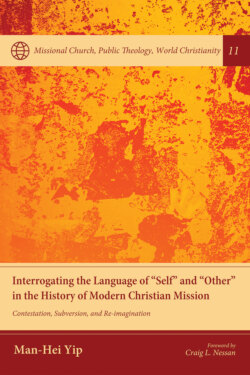Читать книгу Interrogating the Language of “Self” and “Other” in the History of Modern Christian Mission - Man-Hei Yip - Страница 6
На сайте Литреса книга снята с продажи.
Foreword
ОглавлениеThen Jesus told the disciples a parable on the necessity of praying always and not losing heart: “Once there was a judge in a certain city who feared no one—not even God. A woman in that city who had been widowed kept coming to the judge and saying, ‘Give me legal protection from my opponent.’ For a time the judge refused, but finally the judge thought, ‘I care little for God or people, but this woman will not let me alone. I’d better give her the protection she seeks, or she’ll keep coming and wear me out.’” Jesus said: “Listen to what this corrupt judge is saying. Won’t God then do justice to the chosen who call out day and night? Will God delay long over them? I tell you, God will give them swift justice. But when the Promised One comes, will faith be found anywhere on earth?” (Luke 18:1–8 The Inclusive New Testament)
This book is about the persistence, even relentlessness, of those dedicating both their scholarship and their life energy to deconstruct, dismantle, and overcome the structures of colonialism that continue to divide the world and church. Even after decades of postcolonial discourse and practices to implement new ways of relating, the propensity to objectify and thereby disregard “others” plagues our world. Such “othering” is not mere impropriety or political incorrectness. We live at a time when we are witnessing how the prophetic cries warning against categorizing others as “disposable people” in an “age of triage” are being fulfilled. The “othering” of immigrants and refugees in the United States leading to their brutal treatment as a matter of public policy and the crimes against “others” in Russia and China are stunning evidence of a global phenomenon. Despite the formal commitment of the community of nations to the Universal Declaration of Human Rights, disregard for the basic dignity and legal protections due each person is alarming.
“Language is the house of Being” (Heidegger). If how we think is the origin of what we say, then what we say constructs social worlds. We are called to discipline ourselves in thought, word, and deed. Our social reality begins with how we choose to think about things and how we intentionally speak about things. We have daily evidence for how language is being employed in calculated ways to polarize public discourse and identify scapegoats as a form of social control. The anxiety and fear generated in society inevitably leads to policies that scapegoat identifiable victims, yet these dynamics seem hidden from our awareness (Girard). The Gospel of Jesus Christ, culminating in his crucifixion and resurrection, discloses how scapegoating does its harmful work. Christian people, those who center their faith on Christ crucified and risen, are called to name scapegoating for what it is and to resist for Christ’s sake.
Man-Hei Yip makes a significant contribution to reimagining the language of Christian mission, which has been fraught by turning people into “others.” She proposes that we deconstruct shopworn assumptions about “reconciliation” and excavate the biblical texts anew. Reconciliation begins with contrition and repentance as the predisposition for entering reconciled relationships. Her insightful interrogation of biblical and theological texts establishes common ground with readers. Becoming versed in a new language about reconciliation through repentance leads to the practice of interpreting the actions of others in the kindest way. This practice is severely challenged in a political climate where others are daily being objectified by aggressive language. While there is a reactive impulse to retaliate in kind, the power of the cross interrupts spirals of violent rhetoric leading to harmful acts. As Man-Hei Yip contends, “Our language will no longer be the language of damnation and domination, but one that embraces difference and diversity.”
A new language of mission fosters mutuality, not dependence. This extends not only to inter-Christian discourse but to those of other religions or no religion at all. The conviction by Christians that all people are created in God’s image entails infinite respect for the dignity of every person without regard for any qualifying conditions. Special care must be made that those engaged in mission not allow their language to disguise ethnocentric presuppositions that contradict the always life-giving purposes of God. We are invited to be transformed by the language that houses the being of others and learn to live together in the commons created among us. Man-Hei Yip asserts that mission discourse “pays attention to the stories of others” to “foster effective intercultural engagement.” The resulting “intersubjectivity” unfolds in ongoing relationships that remain a journey (“on the way”) and not a destination. We relate to one another dialogically, analogous to the way of friendship, following the instruction of Jesus to love our neighbors as ourselves. The measure of mission becomes the degree to which we ourselves are transformed by these relationships.
This book is a constructive contribution to the necessary process of reimagining what I have elsewhere called “reciprocating mission.” I highly commend this work with its fresh perspectives from a challenging theologian whose voice promises to transform your thought, language, and action.
Craig L. Nessan
Academic Dean and William D. Streng Professor for the Education and Renewal of the Church
Wartburg Theological Seminary
Dubuque, Iowa
Advent 2019
